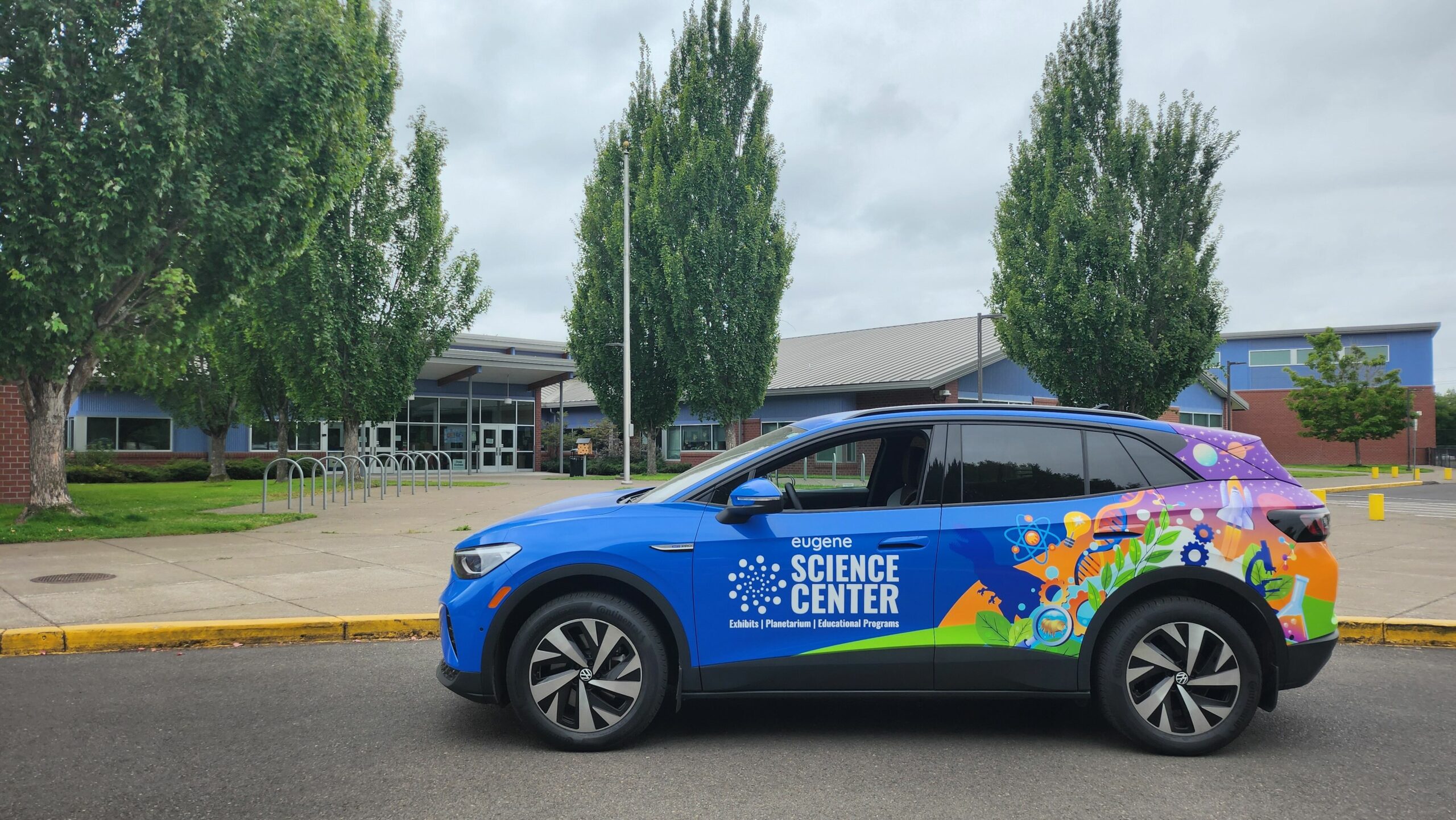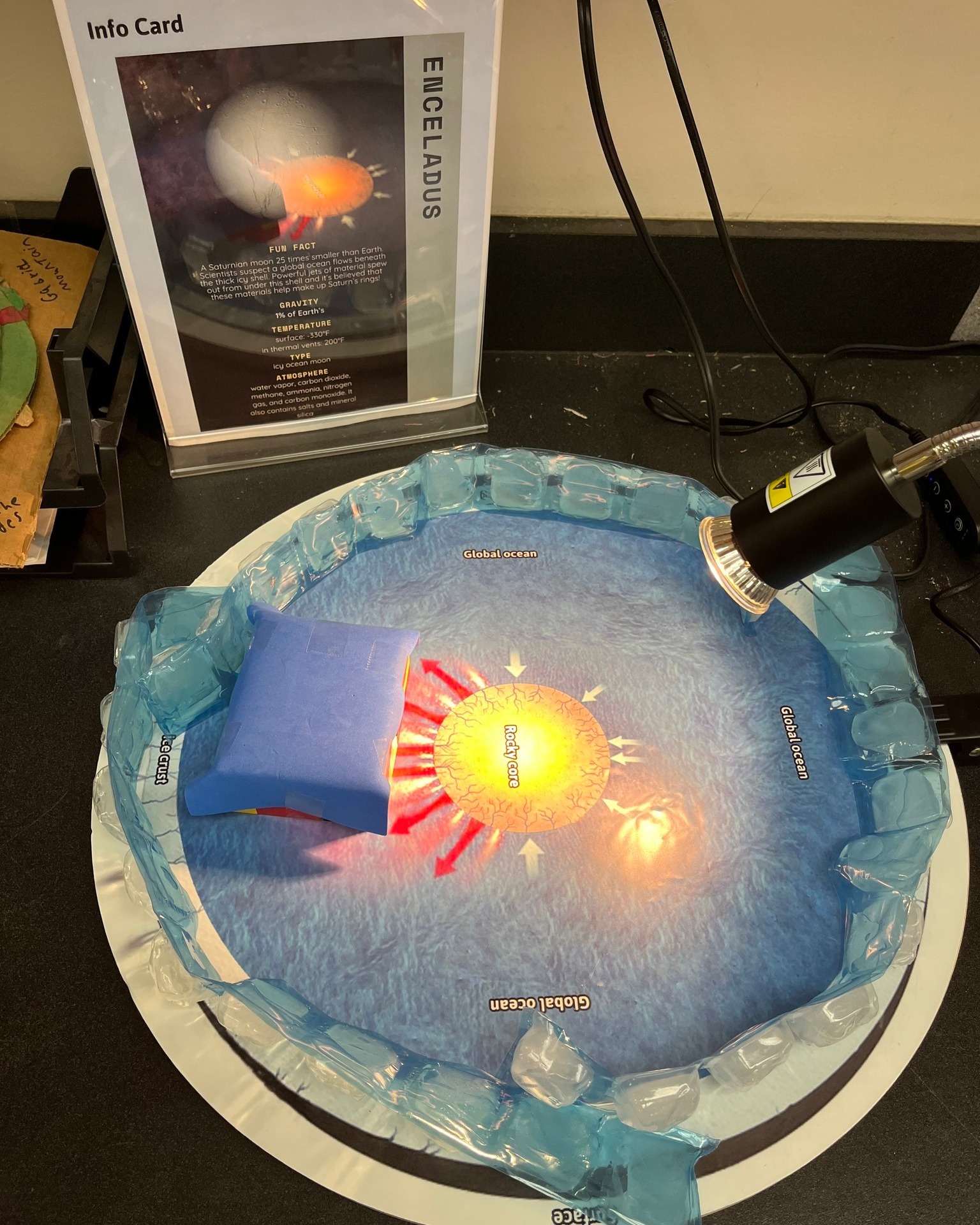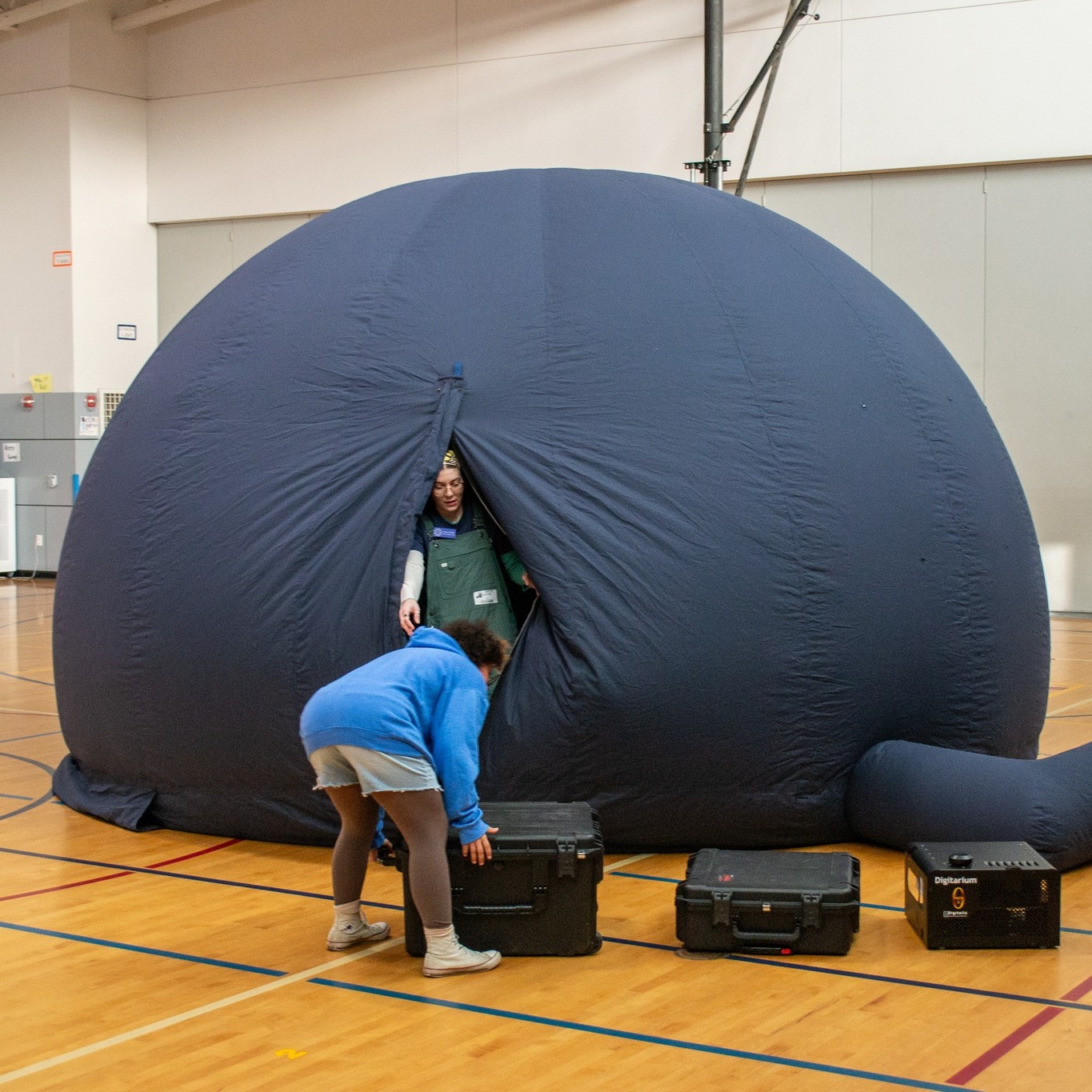Eugene Science Center is pleased to offer programs that bring our engaging, hands-on science lessons directly to your classroom.
Our outreach lessons are crafted to fit right into your school day, delivering 45 to 60 minutes of hands-on, engaging exploration designed for a single class of students.
To ensure the best experience, a teacher must be present to help guide and support the learning. If you want to multiply the fun, we can schedule multiple classes back-to-back — bringing the excitement of science to more students in one visit!
Please contact outreach@eugenesciencecenter.org to request an outreach program to your group.
Other facilities/organizations (libraries, afterschool clubs, public fairs/festivals, etc.) may schedule a Eugene Science Center appearance by emailing outreach@eugenesciencecenter.org with information about the event/program and intended audience.
Electric Outreach Vehicle
Our electric outreach vehicle was purchased thanks to the generous support of an EWEB Electric Mobility Community Grant. This vehicle allows our educators to travel throughout our region with zero emissions to deliver educational programs like the portable planetarium experience listed above.
Schedule our Portable Planetarium
The portable planetarium uses the same software as our on-site planetarium, allowing us to take our exciting and interactive live shows on the road! This state-of-the-art tool was purchased thanks to the generous support of grant funds awarded by NASA and the Siletz Tribal Charitable Contribution Fund.
Portable Planetarium Outreach Requirements:
- 25’x25’ clean indoor area with 15’ ceiling height
- An accessible electrical outlet
- Time for set up and tear down (~20 minutes on each end)
Outreach Activities
Eugene Science Center offers engaging activities for all ages delivered to you!
Is There Water, and Life, Beyond Earth?
Portable Planetarium Show: Step into our portable planetarium for an exciting journey that connects Earth’s ecosystems to the search for life in space! This dynamic show begins right here on our planet, exploring how energy and water interact in the rainforest, desert, and polar regions. Then, we blast off to investigate two intriguing worlds beyond Earth: Mars and Enceladus, one of Saturn’s icy moon. By following the clues water leaves behind, students will explore how energy influences cosmic environments and consider what conditions might support life elsewhere in the solar system. Perfect for curious minds ready to think like planetary scientists!
Classroom Session: Extend the exploration with a hands-on classroom mission to design life-sustaining shelters on other worlds! Following their journey through the solar system, students work in teams to investigate the extreme environments of Mars, Enceladus, and Venus. Using what they’ve learned about energy, water, and the conditions needed for life, they’ll tackle the big question: How could humans survive here? With provided materials, each group will design and build a model shelter to protect against environmental challenges like temperature, atmosphere, and landscape. This interactive experience blends planetary science with creative problem-solving as students imagine what it would take to live beyond Earth.
Whether combining or choosing either experience separately, it’s an unforgettable journey that connects the cosmos to the classroom and inspires students to see the sky—and their place in it—in a whole new way.
Discover the Night Sky Like Never Before!
Portable Planetarium Show: Join us for a captivating live planetarium show that explores the deep connection between humanity and the stars. From ancient civilization to global navigation, cultures around the world have looked to the sky for guidance, meaning, and stories. Let the stars guide your journey through human history in this immersive exploration of storytelling, timekeeping, and celestial wonder.
Classroom Session: Keep the stellar exploration going with the Our Stars, Our First Teachers classroom experience! Our outreach instructors bring engaging extension activities directly to your classroom to build on the lessons from the portable planetarium. Through hands-on, collaborative learning, students will explore how Earth’s orbit around the Sun creates seasons, design their own constellations inspired by the Eugene night sky, and even test their navigation skills using the North Star, Polaris.
Whether combining or choosing either experience separately, it’s an unforgettable journey that connects the cosmos to the classroom and inspires students to see the sky—and their place in it—in a whole new way.
Thanks to the generosity of the EWEB Greenpower Grant, Eugene Science Center has been able to develop our very own Renewable Energy outreach program!
Join our engaging outreach program where students become junior energy scientists! Through hands-on experiments and interactive lessons, students will explore the fascinating world of renewable energy. They’ll learn the basics of clean energy, investigate wind, solar, and hydrogen technologies, and generate electricity themselves! By comparing the effectiveness of different energy sources and discussing their environmental impact, students will gain a deeper understanding of how renewable energy shapes a more sustainable future. Perfect for classrooms ready to spark curiosity and inspire action!
This outreach program could be adapted as a classroom program or scheduled as a tabling experience for events!
Bring the excitement of hands-on science to your school, library, or community event with our portable Wind Tunnel. Designed by our science center’s outreach team, this interactive station lets students test how different shapes and materials behave in moving air — just like real engineers and aeronautical designers!
From flying paper creations to exploring drag and lift, participants of all ages will investigate the fascinating physics of flight and design in real time. Our original wind tunnel is a portable size with a 2′ x 2′ base and a 7′ height. Whether it’s a classroom or a gymnasium, all we need is a standard power outlet and 3 to 5 foot ceiling clearance — we’ll take care of the rest!
Thanks to the generosity of the Chambers Family Foundation, Eugene Science Center has been able to develop our very own Skins and Skulls outreach program!
Discover the secrets of survival, evolution, and adaptation with our Skins & Skulls outreach experience! This traveling exhibit brings real animal skulls, furs, skins, and scales directly to your school or event, giving students an unforgettable close-up look at the features that help animals thrive in the wild, or live alongside us as domesticated companions.
Through guided exploration, students will learn to compare predators and prey, examine how teeth and claws reveal diet and behavior, and understand the evolutionary stories behind familiar (and not-so-familiar) species. It’s a perfect blend of biology, ecology, and anthropology — no textbook required!
All we need is a table and curious minds. We bring the wild to you!
Ideal for classrooms, STEM nights, and natural science units.
Step into the world of bees with our Bee-havior outreach tabling activity — a hands-on, interactive experience that brings the science of pollination, communication, and adaptation of bees to life! Perfect for classrooms, science nights, or nature units, this lab explores the incredible anatomy and behaviors that make bees essential to ecosystems (and our food supply!).
Students will discover how bees use tiny hairs to collect pollen, how their compound eyes see the world, and how the famous bumblebee “waggle dance” helps them share directions to the best flowers. Learn to explore their roles in the environment and find out why protecting pollinators matters.
We bring the buzz — all you need is a space to learn!
Ideal for grades K–8 and anyone curious about the science behind the sting.
Where physics meets fun — one wobble at a time!
Explore the science of stability, motion, and equilibrium in our hands-on Balance Builder tabling activities! Perfect for curious minds of all ages, this mobile physics lab invites students to test, tinker, and discover how forces like gravity, torque, and center of mass work together to keep things balanced — or send them toppling.
From building balanced towers and testing tilting structures to experimenting with levers and fulcrums, participants will learn real-world physics through playful, minds-on exploration. It’s STEM learning in action — no lab coat required.
We bring all the materials and you bring the brainpower!
Perfect for classrooms, STEM fairs, and kinetic learning days.
Investigate with natural dyes and color your world!
This interactive workshop bridges botany, chemistry, and sustainability through the exploration of natural dyes derived from local common plants and weeds! Participants will learn to identify dye-producing plants, safely forage materials, and apply two dyeing methods—solar dyeing and stovetop (cooked) dyeing—to dye wool yarn or natural fibers a range of colors.
The activities are designed to be flexible and inclusive for individuals ages 6+, and the content can be highly adapted to accommodate all needs and skill levels! This makes “Natural Colors to Dye For” ideal for camps, school groups, family programs, clubs, and community events. In this program individuals will learn about plant physiology, environmental science, and the chemistry of natural pigments, while also engaging in a creative and tactile learning experience. Each participant will leave with plant identification handouts, a dye recipe, and a sample of their own dyed yarn. The “Natural Colors to Dye For” program fosters scientific curiosity, ecological awareness, and a lasting connection to our natural world!
We bring the fibers and fun! All that is needed from you is a table surface and an available outlet.





